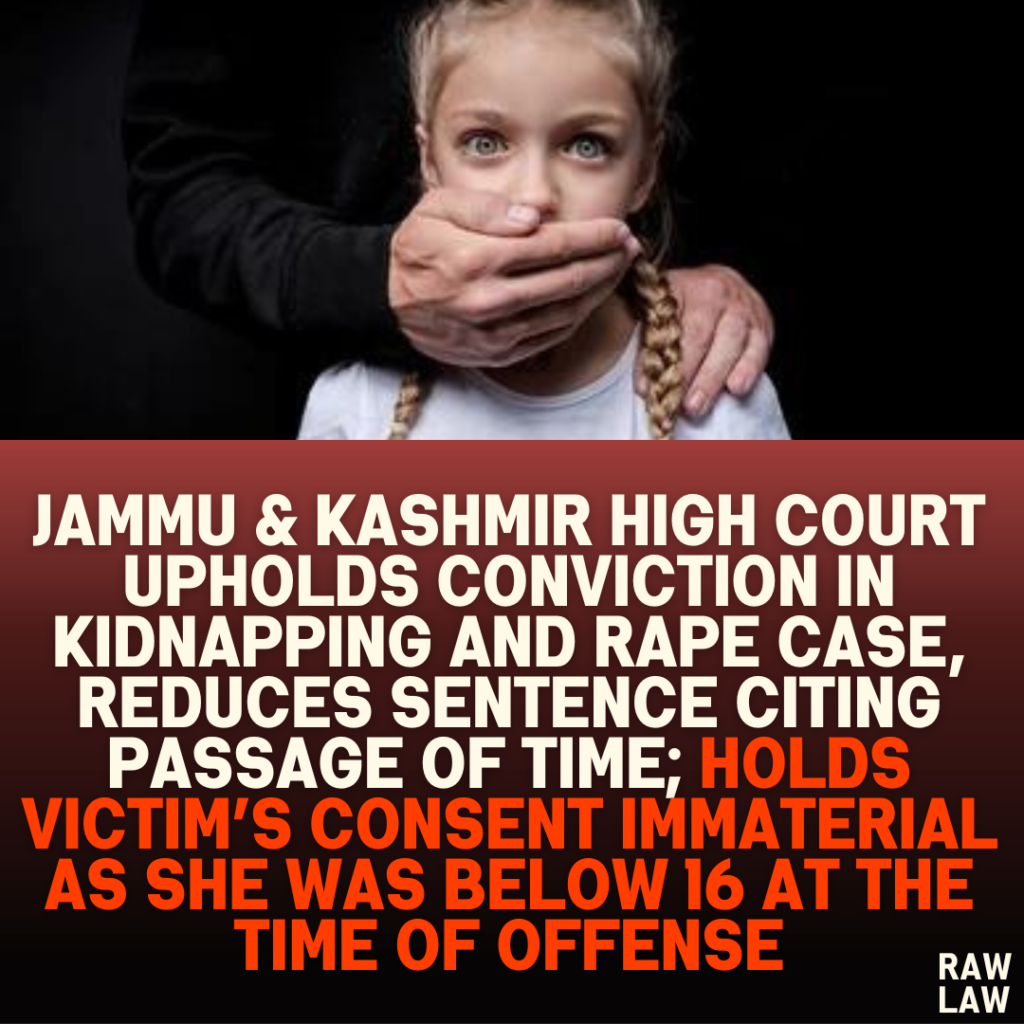Court’s Decision:
The Jammu & Kashmir High Court upheld the conviction of the appellant under Sections 363 and 376 of the Ranbir Penal Code (RPC) for kidnapping and raping a minor. However, the court reduced the sentence for the rape charge from five years to three years, citing the prolonged duration of the case and the appellant’s current family responsibilities. The fine was also increased from ₹2,000 to ₹5,000.
Facts:
The prosecution’s case dates back to July 2004, when the victim, a minor, was allegedly kidnapped by the appellant, who had assured her that he would help her break off an engagement to another man. The appellant reportedly influenced the victim by speaking ill of her fiancée and convinced her to leave her home. They stayed together for several days, during which the appellant forcibly had sexual intercourse with the victim. Medical evidence and witness testimony, including a school certificate confirming the victim’s age as under 16 at the time of the incident, were central to the prosecution’s case.
Issues:
The key issues revolved around:
- Whether the victim was a minor at the time of the offense, making any consent irrelevant under the law.
- Whether the appellant was guilty of the charges of kidnapping and rape, considering the evidence and the testimonies provided.
Petitioner’s Arguments:
The appellant challenged the trial court’s decision on multiple grounds, including:
- Alleged contradictions in the prosecution witnesses’ testimonies.
- The reliability of the school certificate indicating the victim’s age, claiming it was not sufficiently proven as the issuing authority was not examined.
- The medical report’s failure to corroborate sexual intercourse due to the absence of physical evidence such as sperms or marks of violence on the victim.
- A defense based on previous enmity between the appellant’s family and the victim’s family, suggesting the charges were fabricated.
Respondent’s Arguments:
The prosecution argued that:
- The victim was a minor, which was conclusively proven through school records and oral testimonies from witnesses.
- The absence of sperm or physical injury did not negate the occurrence of rape, as the medical examination took place several days after the incident.
- The prosecution maintained that there was no substantial evidence supporting the defense’s claim of previous enmity between the families.
Analysis of the Law:
Under Section 375 of the RPC, as it stood in 2004, any sexual intercourse with a girl under 16 years of age, even with her consent, constitutes rape. The court emphasized that the appellant’s claim of consensual relations was irrelevant due to the victim’s age. The school certificate (though disputed) and witness testimonies reinforced the victim’s minority status, making the appellant’s actions criminal under law.
Precedent Analysis:
The court referred to the Supreme Court’s judgments in Alamelu & Anr. v. State Represented by Inspector of Police and State of Madhya Pradesh v. Preetam, which affirmed the admissibility of school records as evidence in determining a victim’s age, even when the person who entered the data is not available for cross-examination.
Court’s Reasoning:
The court reasoned that the prosecution’s evidence sufficiently proved the victim was below 16 at the time of the offense, making her consent immaterial. The court also rejected the appellant’s defense of previous enmity between the families, citing the lack of substantive evidence to support this claim. Additionally, the court accepted the victim’s consistent testimony regarding the appellant’s actions and the police’s recovery of the victim from the appellant’s custody.
Conclusion:
The court upheld the appellant’s conviction but reduced the sentence for the offense under Section 376 RPC, citing the passage of 20 years since the incident and the fact that the appellant had undergone the trial for 19 years. The court believed that a reduced sentence was appropriate given these special circumstances, while also increasing the fine imposed on the appellant.
Implications:
This ruling highlights the court’s consideration of time and personal circumstances when determining sentencing, even in serious cases involving sexual offenses. However, it also reaffirms that the legal protection of minors is paramount, as any consent from a minor is invalid in cases of sexual offenses. The decision underscores the importance of maintaining the integrity of documentary evidence, such as school records, in establishing critical facts like age.
